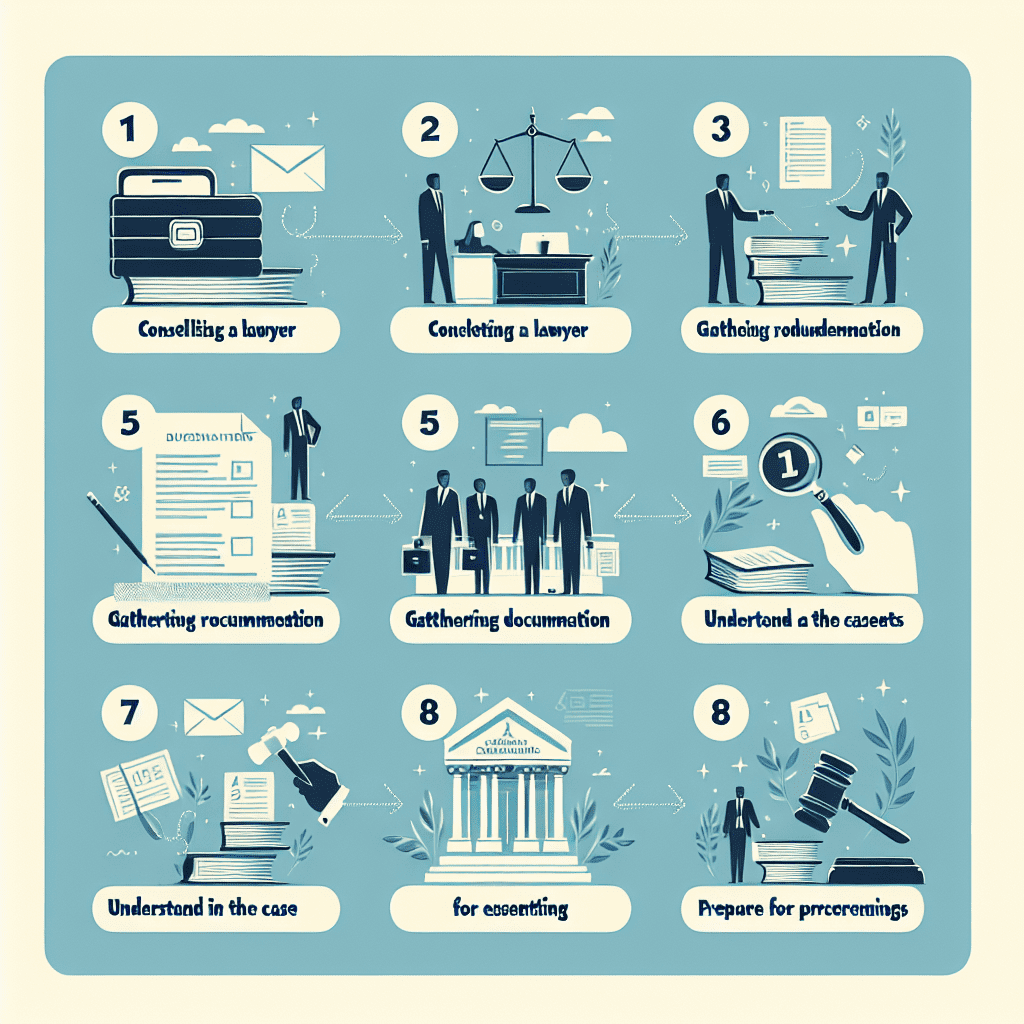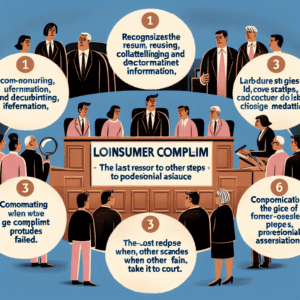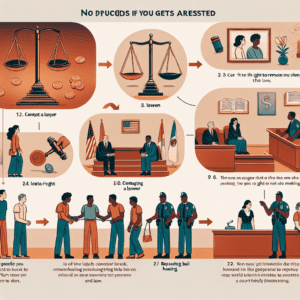“Stay Calm, Stay Informed, Take Action – Your Step-by-Step Legal Guide to Handling a Lawsuit.”
Understanding the Lawsuit: Key Steps to Take Immediately
Receiving notice that you are being sued can be an overwhelming and stressful experience. However, understanding the legal process and taking the appropriate steps immediately can help you navigate the situation effectively. The first and most crucial action is to carefully review the lawsuit documents. Typically, you will receive a summons and a complaint, which outline the claims being made against you and provide important details such as deadlines for responding. It is essential to read these documents thoroughly to understand the nature of the lawsuit, the parties involved, and the specific allegations being made.
Once you have reviewed the lawsuit, the next step is to determine the deadline for your response. Courts impose strict time limits for filing an answer or other legal response, and failing to meet these deadlines can result in a default judgment against you. A default judgment means that the court may rule in favor of the plaintiff simply because you did not respond in time. To avoid this, make note of the deadline and begin preparing your response as soon as possible.
At this stage, seeking legal counsel is highly advisable. Consulting with an attorney who specializes in the relevant area of law can provide you with a clear understanding of your rights and options. An attorney can help you assess the strength of the claims against you, identify possible defenses, and determine the best course of action. If hiring an attorney is not financially feasible, you may consider seeking assistance from legal aid organizations or self-help resources provided by the court.
After obtaining legal advice, you will need to decide how to respond to the lawsuit. In most cases, you will file an answer, which is a formal document addressing the allegations in the complaint. Your answer may admit or deny the claims and may also include any defenses you wish to assert. In some situations, you may have grounds to file a motion to dismiss, arguing that the lawsuit lacks legal merit or was improperly filed. Your attorney can help you determine the most appropriate response based on the circumstances of your case.
In addition to filing a response, it is important to gather and preserve any relevant evidence. This may include contracts, emails, text messages, financial records, or any other documents that support your defense. If there are witnesses who can provide testimony in your favor, make note of their contact information. Preserving evidence is critical, as it can play a significant role in the outcome of the case.
As the lawsuit progresses, you may have opportunities to negotiate a settlement. Many legal disputes are resolved outside of court through settlement discussions or mediation. If a settlement is possible, it can save time, legal expenses, and the uncertainty of a trial. However, before agreeing to any settlement, it is important to fully understand the terms and ensure that they are in your best interest.
Throughout the legal process, staying organized and proactive is key. Keep track of all court deadlines, maintain copies of all documents related to the case, and communicate regularly with your attorney. By taking these steps, you can effectively manage the lawsuit and work toward the best possible resolution.
How to Respond to a Lawsuit: Filing an Answer and Legal Options

Receiving notice that you are being sued can be overwhelming, but understanding the appropriate steps to take can help you navigate the legal process effectively. The first and most crucial step is to carefully review the lawsuit documents, including the complaint and the summons. The complaint outlines the allegations against you, while the summons informs you of the deadline to respond. Ignoring these documents can result in a default judgment, meaning the court may rule in favor of the plaintiff without considering your defense. Therefore, it is essential to act promptly and strategically.
Once you have reviewed the lawsuit, determining how to respond is the next critical step. In most cases, you will need to file an answer, which is a formal written response to the complaint. The answer should address each allegation, either admitting, denying, or stating that you lack sufficient knowledge to respond. Additionally, you may include affirmative defenses, which are legal reasons why the plaintiff should not prevail. Common affirmative defenses include lack of jurisdiction, expiration of the statute of limitations, or failure to state a valid legal claim. Filing an answer ensures that you participate in the case and present your side of the story.
In some situations, rather than filing an answer, you may choose to file a motion to dismiss. This legal request asks the court to dismiss the case for specific reasons, such as improper service of process or failure to state a claim upon which relief can be granted. If the court grants the motion, the case may be dismissed entirely or require the plaintiff to amend their complaint. However, if the motion is denied, you will still need to file an answer within the time allowed by the court. Consulting an attorney can help determine whether a motion to dismiss is a viable option in your case.
Beyond filing an answer or motion, exploring other legal options is also important. Settlement negotiations may be a practical alternative to litigation, as they can save time and legal expenses. If both parties are open to discussion, mediation or direct negotiations may lead to a mutually agreeable resolution. In some cases, alternative dispute resolution methods, such as arbitration, may be required by contract or court order. Understanding these options can help you make informed decisions about how to proceed.
If the case moves forward, preparing for litigation becomes necessary. This involves gathering evidence, identifying witnesses, and complying with court procedures. The discovery phase allows both parties to exchange relevant information, which may include written questions, document requests, and depositions. Properly responding to discovery requests and preserving evidence can strengthen your defense. Additionally, attending court hearings and complying with deadlines is essential to avoid negative consequences.
Throughout the process, seeking legal representation can provide significant advantages. An experienced attorney can help you understand your rights, develop a strong defense strategy, and ensure compliance with legal procedures. Even if you choose to represent yourself, consulting an attorney for guidance can be beneficial. By taking proactive steps and understanding your legal options, you can effectively respond to a lawsuit and work toward a favorable outcome.
Preparing for Court: Gathering Evidence and Building Your Defense
When facing a lawsuit, preparing for court is a critical step in ensuring the best possible outcome. One of the most important aspects of this preparation is gathering evidence and building a strong defense. The strength of your case often depends on the quality and relevance of the evidence you present, as well as how effectively you organize and use it to support your position. Therefore, taking a strategic approach to collecting and analyzing evidence is essential.
To begin, it is important to identify all documents, records, and other materials that may be relevant to your case. This includes contracts, emails, text messages, financial statements, receipts, and any written communication related to the dispute. If the lawsuit involves a business transaction, employment matter, or personal injury claim, reviewing all available records can help establish a clear timeline of events. Additionally, preserving any physical evidence that may support your defense is crucial. For example, in a property dispute, photographs of the property in question can serve as valuable proof.
Once you have gathered all relevant documents, organizing them in a logical manner will make it easier to present your case effectively. Creating a detailed timeline of events can help clarify the sequence of actions that led to the lawsuit. This timeline should be supported by corresponding evidence, ensuring that each claim you make is backed by factual documentation. Furthermore, keeping multiple copies of important documents and storing them securely will prevent any loss or damage that could weaken your case.
In addition to documentary evidence, witness testimony can play a significant role in strengthening your defense. Identifying individuals who have firsthand knowledge of the events in question and obtaining their statements can provide additional support for your claims. Witnesses may include colleagues, business partners, customers, or anyone else who can offer relevant insights. If possible, obtaining written statements or affidavits from these individuals can help ensure their testimony remains consistent and credible. Moreover, if a witness is willing to testify in court, their presence can add further weight to your defense.
As you gather evidence, it is also important to anticipate the arguments that the opposing party may present. Understanding their claims and identifying potential weaknesses in their case can help you prepare counterarguments. Reviewing any evidence they have submitted and analyzing how it may be challenged is a key part of this process. If there are inconsistencies or gaps in their claims, highlighting these issues can strengthen your position. Additionally, consulting with a legal professional can provide valuable insights into how best to approach your defense strategy.
Throughout this process, maintaining clear and open communication with your attorney is essential. Legal professionals can help assess the strength of your evidence, advise on the best course of action, and ensure that all necessary documents are properly filed with the court. They can also assist in preparing for any pre-trial motions or hearings that may arise. By working closely with your attorney and staying organized, you can build a well-supported defense that increases your chances of a favorable outcome.
Ultimately, thorough preparation is key when facing a lawsuit. By gathering relevant evidence, organizing it effectively, securing witness testimony, and anticipating opposing arguments, you can strengthen your defense and present a compelling case in court. Taking these steps not only improves your chances of success but also helps you navigate the legal process with greater confidence and clarity.
















